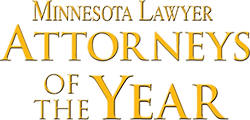Frequently Asked Questions
Petty Misdemeanors - minor traffic violations such as speeding and parking tickets.
Misdemeanors - first time DWI, first time DWI under .20%, petty theft, assault.
Gross Misdemeanors - repeat DWI, first time DWI over.20%, mid-level theft, minor sexual misconduct.
Felonies - murder, burglary, robbery, aggravated assault, four-time DWI Offenders (within ten years), drug offenses and most sexual assault cases.
Petty Misdemeanors - no jail time, monetary fines up to $300.
Misdemeanors - maximum of 90 days in jail, monetary fines up to $1000 and probation up to 2 years.
Gross Misdemeanors - maximum of 1-year in jail, monetary fines up to $3000 and probation up to 6 years.
Felonies - depending upon the circumstances of the case, sentences are in excess of 1-year and up to a maximum of life in prison. Minnesota does not have a death penalty.
As part of your sentence, you may be required to attend alcohol or drug treatment, anger management counseling, driver improvement classes and other programs. More serious offenses may affect your life in other ways, even if you have completed your sentence. Your ability to get employment or maintain a professional license, your rights to vote, your rights to privacy (sex offender registry), your ability to obtain a driver's license and insurance, your ability to possess firearms, and other negative consequences may stay with you for the rest of your life. Lastly, your criminal defense, how it is handled and the outcome may affect whether a civil lawsuit is brought against you.
Petty Misdemeanors are relatively simple and involve an arraignment and a court trial, without the right to a jury. If you contest the case, your attorney may file a waiver so you do not have to appear at the trial. Crimes such as Misdemeanors, Gross Misdemeanors, and Felonies typically involve 3 steps: arraignment, pretrial hearing, and trial.
An arraignment is typically the criminal defendant's first appearance in court where charges are formally read, a plea of not guilty may be given, conditions of release are reviewed and future court dates are set.
Bail is a monetary deposit made with the court to ensure the future appearance of a criminal defendant. Once the judge sets bail and it is provided to the court, you will be released. If you are released on your own recognizance and without requiring bail, you are making the promise to appear for all future court hearings. In the case of a very serious crime, bail may be set very high. Once you are released on bail, you must attend all subsequent court hearings or risk having your bail forfeited. If you are helping out a friend or loved one by putting up money or collateral (your house or your car) for their bail, you risk losing it if that person does not appear in court.
Depending upon the severity of the offenses, the Pretrial Hearing deals with evidence (police reports, laboratory reports, witness lists, statements, etc.) that support the charges against you. During this stage, you may enter a plea and consider settlement offers. Often times, many cases are settled during the pretrial stage. If your case is not settled, a "bench trial", "jury trial", or "plea hearing" will be scheduled.
If your case has not been settled and makes it to trial, Misdemeanor and Gross Misdemeanor offenses provide you with the right to have a six-person jury or a court trial. Felony cases require a twelve-person jury or a court trial. During the trial, the Prosecutor and your defense attorney will present the evidence, the judge or jury will determine the verdict and you will either be acquitted or convicted.
Communities we service in Minneapolis;
55119. 55106. 55104. 55116. 55107. 55117. 55108. 55102. 55105. 55103. 55130. 55114. 55101. 55120. 55121. 55122. 55123. 55077. 55068. 55124. 55076. 55071. 55055. 55044. 55306. 55372. 55378. 55317. 55347. 55331. 55364. 55384. 55359. 55356. 55387. 55322. 55315. 55352. 55364. 55359. 55322. 55315. 55352. 55328. 55373. 55341. 55340. 55374. 55327. 55316. 55304. 55001. 55128. 55109. 55115. 55109. 55110. 55090. 55003. 55113. 55108. 55318. 55401. 55402. 55403. 55404. 55405. 55406. 55407. 55408. 55409. 55410. 55411. 55412. 55413. 55414. 55415. 55416. 55417. 55418. 55419. 55420. 55421. 55422. 55423. 55424. 55425. 55426. 55427. 55428. 55429. 55430. 55431. 55432. 55433. 55434. 55435. 55436. 55437. 55438. 55439. 55440. 55441. 55442. 55443. 55444. 55445. 55446. 55447. 55448. 55449. 55450.






